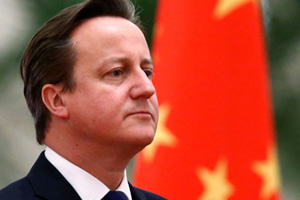British PM misses the connection

Cameron taking small businesses to the heart of China but not to the heart of Chinese business
British Prime Minister David Cameron remarked during his recent and much publicized trip to China that "if you are thinking of investing in Britain, come and find us. You will get a warm welcome".
But is a "warm" welcome sufficient to instigate and cement lasting, symbiotic trade relationships between the UK and European industry and China?
Cameron's trade mission, with more than 100 UK business leaders, was one of the largest delegations to visit China in recent years. No effort appears to have been spared during this three-day charm offensive. The UK prime minister met Chinese President Xi Jinping and Premier Li Keqiang. He also traveled to Southwest China's Chengdu, widely considered to be one of the most important areas of future economic development.
But for any sudden spurt in trade between the UK, the EU and China to take place and for lasting business relationships to develop, it behooves UK and European industry to become far more understanding of China, Chinese culture and particularly Chinese business culture - something that appears missing.
As part of my research work in the areas of Chinese consumer behavior and organizational behavior, I am setting up a China business center. Recently this has involved meeting over 100 small and medium-sized UK enterprises, precisely the group of companies targeted by the prime minister. Incredibly, those I met from these companies failed to produce much if any knowledge of China, Chinese culture and Chinese business culture. All companies made it very clear that China represents the future and they all would like desperately to be "in" this market, and soon.
My research also revealed that concepts that lie at the heart of Chinese culture such as "face" and guanxi (loosely defined as connections) are also widely misunderstood among the majority of UK and European companies. This misunderstanding is most acute among the army of Europe's SMEs.
Training and staff development generally gets relegated to the back burner much more within smaller firms, which probably explains this relative lack of knowledge.
It is, therefore, not sufficient of the UK prime minister to offer a "warm" welcome to China's vast army of ever internationally expanding companies. Rather, UK and European SMEs require a very "warm" welcome to an intensive education and training program on China.
To gain sufficient respect of any potential Chinese business partner, such a program has to go beyond business culture and also focus on Chinese history and culture generally. It is also imperative, given the vast size of the Chinese mainland, that any program focuses on one or just a few geographical regions.
Not surprisingly, my research highlights the fact that UK and European businesses remain unaware of opportunities outside of China's first-tier cities such as Beijing and Shanghai. However, it is the opportunities in second and third-tier cities, such as Chongqing and Chengdu in Southwest China and Shenyang in Northeast China, that now offer great rewards.
Second and third-tier cities in China represent the future where economic growth and market opportunity have to accelerate if China's economic miracle is to continue. But these cities and regions are even less well known and, therefore, pose even greater challenges, especially in regard to local partner selection and market information.
UK and European businesses should consider multiple partners, and not just search for one perfect partner that probably can never be found. Secondly, they should not only search for and screen partners in China but invite likely candidates over to the UK and Europe to engage them further.
The importance of industry clusters, first popularized by Michael Porter in 1990, continues to attract attention. This is now extremely pertinent in the case of China where international expansion of the Chinese SME sector is crucial to further economic growth.
Approaching clusters of Chinese SMEs with the "going global" carrot should therefore lead to greater likelihood of success - even greater if potential Chinese business partners are invited to Europe. Such an invitation will rarely be refused and will, in an instant, identify the Chinese business' key decision makers. Only the most powerful and influential will accept this invitation.
Partnership selection and formation can only work well if key decision makers and influencers on each side establish a solid rapport. An all-expenses paid business trip to the UK and Europe could be seen as a crucial first step in any guanxi-building bond.

Once in the UK or mainland Europe, the leaders of any potential Chinese partner will be very conscious of gaining and losing "face". It is essential therefore that any European business hoping to tie up long-term deals with China make every possible effort to allow their potential Chinese business partners to gain "face". This will entail publicly praising their Chinese delegation, especially the leading figures, and displaying admiration of their business achievements and the spectacular growth of China generally.
Any visiting Chinese business delegation will be very interested in Western culture and will highly value information and trips that allow them to further their understanding. But an even greater value will be placed on any evidence of the host business' understanding of China and Chinese culture.
There is no easier or more tangible display of such an understanding than a meal at an authentic Chinese restaurant with a selection of genuine Chinese dishes. Chinese guests will not only be extremely happy with what will be considered "proper" food, but will regard this as a deep commitment to doing business with a Chinese partner. During the meal, frequent toasts will also be received warmly, which is always the case at a typical business meal in China.
However, it is the issue of market information where UK and European SMEs display not inconsiderable ignorance and most require clarification. A myriad of rules and regulations and frequent changes only causes concern and confusion to those with little or no understanding of China, especially Chinese business culture. Rules and regulations are of course important in China, but so is guanxi and "face", and often they are much more important.
Guanxi is a sufficient approximation of which initially requires identification and knowledge of the key decision makers inside a Chinese company.
Cameron's recent visit very much attempted to highlight business opportunities for UK and European SMEs with their Chinese counterparts, where the identification of key decision makers is often far easier than it is within China's many sprawling state-owned enterprises.
The development of guanxi within smaller Chinese companies should therefore be easier and quicker. Once established, it will then lead to the unraveling and understanding of any relevant trade rules and regulations. It will also lead to a deeper understanding of China's national and local business culture and all aspects of the local environment.
The key then to a better understanding of market information is not a detailed study of rules and regulations but the development of good relations and connections with key members of the Chinese business community.
UK and European businesses - SMEs in particular - require government-led education and training initiatives that put a detailed understanding of the Chinese business environment and business culture at the heart of their overseas expansion plans.
The author is a visiting professor at the University of International Business and Economics in Beijing and a senior lecturer on marketing at Southampton Solent University's School of Business. The views do not necessarily reflect those of China Daily.





